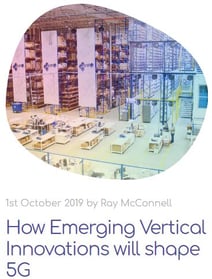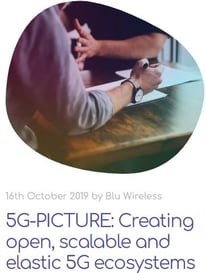Many UK cities have already ‘switched on’ 5G. This technology however, is much more than just faster internet speeds for your phone, with the biggest developments yet to come. 5G is the next generation of wireless technology which will deliver performance and power like never before. In fact, it will connect people, devices and industry to create a network of networks for internet connectivity.
It’s not just mobile operators, like EE and Vodafone who will be supplying the 5G of the future – far from it in fact. The UK is making waves with 5G innovation. We’ve outlined who is developing 5G technology and how it’s going to be implemented.
Who is currently developing 5G in the UK?
A wide range of players are researching and developing 5G networks. Government, MNOs, SMEs and academia are all taking part in the 5G deployment race.
However, these industries and companies need to take on different roles. Manufacturers will create the hardware, technology innovators will develop the software, service providers will sell the product to customers and some will even overlap. To deliver a final product, these elements need to come together. That means industries and companies will need to collaborate.
This is the ecosystem that will launch 5G networks for the UK and beyond.
How will the UK deploy widespread 5G networks?
Despite being considered by some as a necessity, like water or electricity, 5G provision is essentially a business. Therefore deployment of 5G may not be as easy as people may think. Although many industries want to implement 5G networks, their different motivations can often conflict and act as blockades to one another.
Local authorities want to deploy 5G as a widespread network, including rural broadband, smart cities, smart health and more. This is because accessible, reliable connections will have positive social and economic effects on society. For example, 5G speeds and better connectivity will significantly improve healthcare efficiencies and processes.
However, MNOs are already established in the industry. While they are interested in various applications, their main focus will be on profitable areas such as gaming technology, broadcasting and mobile. They are under pressure to implement 5G networks for their customers, which is a costly process to undertake as a single entity.
Unfortunately, the areas which create revenue – and therefore MNOs are targeting – don’t always correspond to the areas which will have the widest social and economic benefits. The activity of larger players resultantly can price out local councils who want 5G for less profitable applications. This stands in the way of mass 5G rollout for rural areas or healthcare, for example.
Ultimately, the government can’t afford to roll-out universal 5G for the entire nation on its own. But neither can MNOs. The most obvious solution to this is collaboration and infrastructure sharing. Big players can implement a backbone of technology which local councils can build upon. This is beneficial to both operators and Government.
Operators can maintain a competitive stance in the market, so won’t lose their hold on 5G. Government can affordably deploy connections in the areas that need it most, which improves socioeconomic conditions for these areas and benefits the population as a whole. It’s a win-win for everyone.
What is the role of academia in 5G development?
Academia is another sector who has already entered the market space. Academic research into connectivity solutions have played a part in driving 5G technology development and infrastructure.
Universities entering this market can break the ice for non-established players to enter, and at a financially competitive level to operators. By teaming up with SMEs, universities could enable more local 5G projects and become disruptors in their own right, lessening larger operator control. This would speed up progress in the sector by adding competition and encouraging collaboration.
However, this is a new strategy for UK technology and telecoms development. Universities didn’t always function like this – previously research was their main focus. Now they are adopting business-like models by getting involved in development.
The UK can combine the resources of universities with the innovation of start-ups and SMEs. By doing so, the nation’s businesses are given more potential for growth in the global market. It would also accelerate this growth, making the UK an even more competitive contender.
What examples are there of UK academia and business working together in 5G?
These kinds of business and academia partnerships are already happening. Surrey University has introduced their 5G innovation centre which collaborates with big players such as Telefonica, Vodafone and Huawei. But they are also empowering disruption by encouraging SMEs to collaborate and enter the 5G mobile market.
Blu Wireless has been a catalyst for academic and business collaboration, working with the 5G Innovation Centre at the University of Surrey on a high-speed transport 5G application. Some other big names involved were ARM, McLaren, Quortus, Dense Air Ltd, and Real Wireless. The AirSpan-led AutoAir project achieved 4k video transmitted at 1Gbps from fast-moving vehicles to a screen on a bus.
Blu Wireless has also worked on the 5G-Picture project, which saw collaboration across European industries. They worked with rail operator Ferrocarrils de la Generalitat de Catalunya (FGC), infrastructure and engineering corporation, COMSA, optical network specialists, ADVA and non-profit academic consortium, Consorzio Nazionale Interuniversitario per le Telecomunicazioni (CNIT) to provide high-speed WIFI to train passengers.
Academia and SME collaboration is not the leading provider of 5G. But it is responsible for much of the pioneering developments in the space. This collaboration has also lead to solving issues which other big-name operators have largely ignored, such as rural broadband and track-to-train solutions.
Related topics
How does UK 5G development compare to the US?
The biggest difference between the US and the UK are their business models.
The connection between academia and industry in the US market already has good foundations. Many companies in the US have come from academia which has given industries solid technical backgrounds. This also encourages companies to involve US academia in their business development.
When looking for investment, this become particularly beneficial. VCs also tend to come from a technical background in the US. Then when companies look to innovate upon traditional models, VCs are more likely to take risks and invest in these technically minded businesses.
Therefore, this agile system has helped the US become a strong player in the connectivity market. By supporting US academia, applying technical knowledge to business development, and embedding a willingness to take risks, the US telecoms market has been able to rapidly grow.
This contrasts to the UK where the telecoms industry has often been defined by long sales cycles from operators, a wariness towards dramatic innovation from VCs, and investment in international technology. Together these factors have historically resulted in slower development and growth from UK technology.
This however has recently begun to change, and the UK is making strides in the connectivity market locally and globally.
How will 5G be launched in the UK?
In the past, 5G was thought to be mainly for mobile phones. The biggest widely-known difference being that it’s faster than 4G.
Now the primary use cases – and improvements – are significantly wider than this. 5G can create a ubiquitous network to empower IoT, Smart Cities, Smart devices, reliable home WIFI, e-health, and much more. This is all due to its robust abilities to connect communications, provide reliable and high-quality internet, extremely low latency. It’s more than just a speed upgrade from 4G.
These applications are also scalable. Industry and societal applications offer much larger revenue opportunities and are products that can be taken global. These applications will be more diverse, adaptable, and widespread than mobile 5G.
In fact, there have already been governmental promises for universal, nationalised broadband. This will be an inevitable and essential step in developing the technology that will power connectivity. 5G applications have the potential to drive societal improvements for citizens, health, security and more.
Why is 5G deployment necessary?
Without universal networks in the UK, Smart Cities and IoT applications won’t be fully possible. Enterprises are relying on it to implement their highly anticipated IoT business models. Unless quality connectivity can be accessed anywhere, Smart Cities won’t function as designed.
That’s why 5G in the UK needs to be launched for more than just mobile, and connectivity needs to be deployed in further reaching places than central cities.
Is 5G available in the UK now?
In short, yes. The UK is deploying 5G in various applications across the country.
There are several large operators deploying their 5G for mobiles in the UK. EE first introduced 5G to cities across the UK, then O2 and Vodafone quickly followed suit with their own 5G cities.
Smaller players are disrupting the market in the UK with more innovative use cases. There have been several testbeds for Smart Cities in locations such as Bristol with great success. The Bristol smart city was powered in a joint venture by University of Bristol and Bristol Local Council highlighting what positive collaboration can achieve.
The transport sector and fixed wireless access technology are also experiencing rapid development from SMEs. Together with Blu Wireless, FirstGroup and Southern Rail are pioneering high speed transport connectivity. The Liverpool health testbed is using fixed wireless access to empower more efficient health and social services.
Although there is much more work to be done, the UK is gaining momentum in network connectivity. 5G is getting greater interest and greater investment as we discover more about its possibilities and use cases. Through collaboration, we are quickly moving towards our goal for universal 5G connectivity.
Get in touch to find out more about how Blu Wireless are driving development in the UK 5G market.












